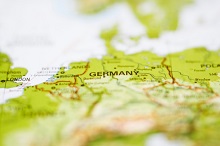German: The World of Music, Philosophy, and Environmental Issues
June 27, 2016

Germany is well known as an environmentally advanced country. The Japanese people are familiar with philosophers such as Kant and Hegel, and thinkers such as Marx, Nietzsche, and Freud. Germany has produced many great talents in the fields of literature, physics, and music as well. The German language is also spoken as the official language of many European countries. This means that an ability to understand German broadens one's range of communication, while at the same time making it possible to deepen one's knowledge in a variety of areas. Let's take a look at some of the appealing aspects of the German language.
Characteristics of the German Language
German is, of course, a Germanic language, and is the native tongue of approximately 100 million people. Like English and Dutch, it is classified as a West Germanic language, so it shares many traits with English. It also has many similarities to the North Germanic languages, Swedish, Norwegian, and Danish.
In addition to Germany, it is spoken as an official language in Austria, Switzerland, Luxembourg, and Liechtenstein. German is also spoken in areas that have a deep historical connection to Germany, such as parts of Italy and France, as well as areas that were at one time under German control. Incidentally, German is the sixth most spoken language among Internet users.
Germany: A Model for Japan
Germany was considered a model in many areas during Japan's modernization in the Meiji Period. Japan pursued German knowledge in law, medicine, science, and the arts with particular vigor. Ito Hirobumi's use of the Constitution of Prussia as a reference when drafting the Meiji Constitution is well known in Japan.
That influence is evident even today, with the frequent use of German in the fields of medicine and science, as well as in mountain climbing and skiing terminology. For example, the German medical terms karte ("medical chart") and gips ("plaster cast") and the ski terminology gelände ("ski slope") and stock ("ski pole") are used commonly in Japanese. It is likely that the fame of German composers such as Bach, Beethoven, and Wagner in Japan is due to the impact of the language during that time.
Germany and Japan were allies during World War Two, and both were defeated. Both countries also achieved incredible growth after the war, particularly in manufacturing. Being relatively small geographically is another similarity between Germany and Japan. In addition, Germany's energy policy as it moves forward with denuclearization is deeply connected to the nation's environmental policy, even now providing Japan with an abundance of things to learn.
Similarities to Japanese and Ease of Learning
German words are pronounced very closely to how they are spelled, and can typically be read as a Japanese person would read romaji ("romanized words"). This makes pronunciation relatively easy for Japanese speakers. Many German words are similar to their English equivalent, so the language can be easy to learn for people who have studied English too. The aspects that Japanese people typically have a more difficult time with are differentiation of masculine, feminine, and neuter nouns, and declension of nouns, adjectives, etc. Similar to English, German verbs change according to person, but the higher number of changes in German could mean a bit of a struggle until you become accustomed to them.
Because German grammar involves declension, the role of each word in a sentence is easy to determine, although word order is relatively free. As a rule, word order is set in English, but in a German declarative sentence, the order of other parts doesn't matter as long as the verb comes second. This freedom of order is slightly similar to Japanese.
German also has a high capacity for making compounds, so it is possible to create other words with ease by connecting a noun to another noun. Like Japanese, if you learn a certain number of nouns, you can apply them to create other nouns, which is very convenient.
Summary
Many people learn German as a second language in college, so compared to other non-English languages, Japanese people are relatively familiar with German. It has many similarities to English, and in some cases German terminology has been incorporated into Japanese as loan words, so it should be very approachable for new learners.
As a core member of the European Union (EU), Germany is deeply connected to environmental issues, philosophy, music, etc., in Europe. The great appeal of learning German is the ability to get to know the diverse cultures of Europe.
Related Services
To Contact Us Regarding Our Translation Services
For urgent needs, call:
+81-3-5730-6133
